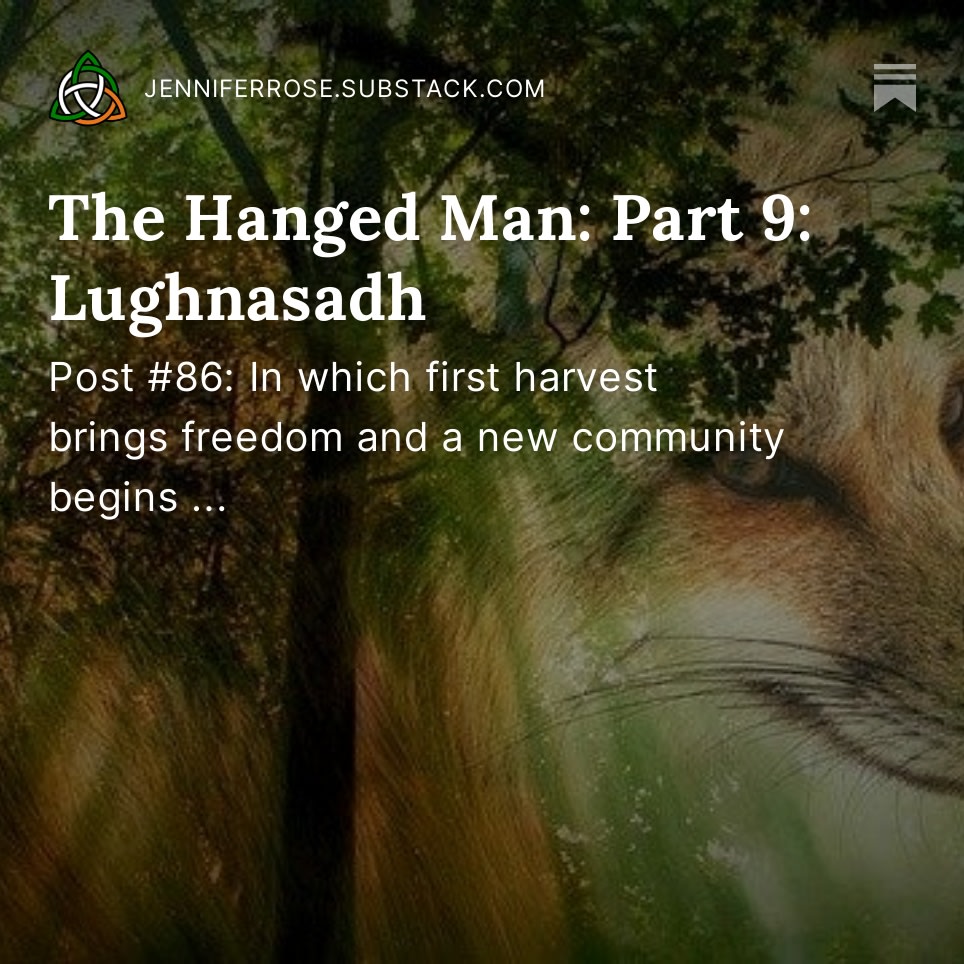by Jenny Rose | Jul 6, 2024 | A Flourishing Woman, Spirit
Unusually, I’ve struggled the last couple of weeks to find something I wanted to write about for this post. At times I feel so heavily weighted with grief, fear, and despair about our world (and I mean our to include all people, all species, all life on this lovely, feverish planet suspended in the cool bed of space) and the apparent lack of sane, unified values and problem solving, it’s all I can do to keep putting one foot in front of the other. I’m sustained by my communities on Substack and in real life, my garden, and the simplicity of whatever moment of Now I inhabit. At this moment Now is the smell of chicken crisping in the air fryer, the cool, damp air of a July 4th morning in central Maine coming in open windows, the weight of my laptop on my lap, the feel of its keys under my fingers, and the sleeping cats. It’s a day off. I relish it.

Photo by NASA on Unsplash
I don’t want to write about the state of the world. I have nothing to add to the conversation that feels effective or positive. I’m one of the silent millions, maintaining faith and courage as best I can for my own sake as well as the sake of those around me.
Earlier in the week I received a post from Dr. Sharon Blackie titled ‘Following the Wrong Gods Home’ that caught my imagination and gave me a different perspective.
Through the fog of sadness and fear a clear question rang in my mind: what would Baba Yaga do? And another: what gods am I following, and are they taking me home? And then, I can choose which gods to follow.
Sometimes I forget that.
Just like that, I was back in my power. I jotted down some quick notes and went off to work, feeling better.
Dr. Blackie didn’t mean this question in the formal religious sense, but in the metaphorical sense. Much of what is happening in the world now has to do with the gods people create, worship and follow. Not only real people but gods like money, status, technology, and power. To them we build temples, make blood offerings and human sacrifices. We worship them with our belief and our lives and place them above the law, feeding them with power, and they are rapacious.
No wonder Justice is blindfolded. I’m in complete sympathy. We should give her ear plugs, too.
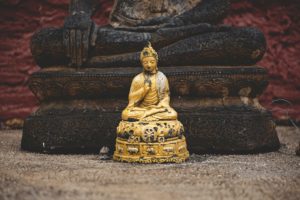
Photo by Peter Hershey on Unsplash
I think a lot about gods and goddesses. I research their stories and cultures, explore their symbols, sculptures and depictions. I write about them, dream about them, and work with various card decks referencing them. I think about our consistent human propensity to reach for something larger than ourselves, something wiser, stronger, more powerful. We seek some sense of meaning, hope there is reason for all this chaos, that one day we will come back home to ourselves and our family of all human beings on Planet Earth.
Of all the gods and goddesses I’ve made friends with, I love Baba Yaga the best. I’ve written about her before on this blog. She’s Slavic, a hag goddess associated with witches (of course).
I don’t think of myself as a feminist, but the Baba is, for me, the perfect embodiment of female wholeness. She is not obedient or submissive. She is not attached to a man. She carries no shame, no guilt. She’s wild, primal, and powerful. She has feelings and expresses them. She lives proudly in her (conventionally) hideous body. (I’m sure she doesn’t shave, trim, deodorize, make up, color her hair, do her nails or dress appropriately for her age.) She cannot be silenced. She is wise and ancient beyond wisdom and years. She does not suffer fools. She pleases only herself.
A long time ago, in an audio production narrated by Clarissa Pinkola Estes, she said women were made for times like these. I haven’t thought about that in years, but the morning I read Dr. Blackie’s post I remembered it, and I stood a little taller as I made breakfast.
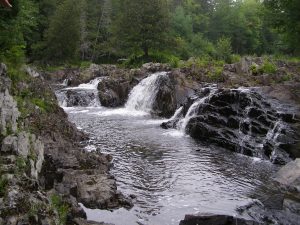
By Carmine Leo
Women, after all, know how to live in a desert. We know how to live underground. Like water, we learn how to go around obstacles and wear away stone. Women endure. We wait. We bide our time and survive. Individuals may be burned, or killed, or silenced, but collective female wisdom lives on in stories, skills and crafts, recipes, traditions and ritual. Women, as vessels of life, understand death. We know how to let die what must, even if it’s ourselves. We know endings are always beginnings.
These are not times for too-sweet maidens and princes on white horses. These are times for survival, clear seeing, hard choices, courage, cunning, and strength. These are times in which we must remember how to be responsible for our own safety, reproductive health and autonomy, and education. We don’t need permission. We don’t need approval. We don’t need men to take care of us. We’ve never needed those things; it’s time to recall and reclaim that truth and teach our younger sisters and daughters how to be wild and true.
We can always make choices. I have already left Ozymandias lying in the desert behind me. I will not follow fear and despair; they cannot take me home. I will not comply with repression and oppression, neither my own or that of others. I will not be silenced. I will resist. I will persist. I will face whatever comes with my head up. I will go around, or under, or over whatever or whoever attempts to control me.
I will choose which gods to follow home.
Questions:
- Which gods have you followed in your life? Did they take you home?
- Have you chosen the gods you follow, or were they thrust upon you?
- What sacrifices and offerings have your gods demanded of you?
Leave a comment below!
To read my fiction, serially published free every week, go here: 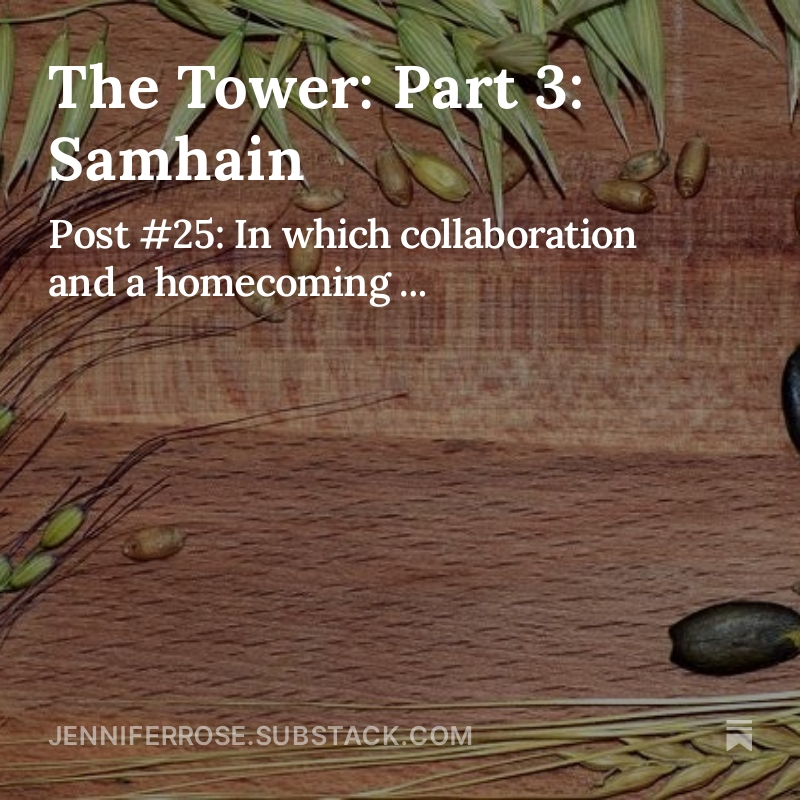
by Jenny Rose | Feb 3, 2024 | Connection & Community, Emotional Intelligence
For me, February 1st is the first day of spring. I know it’s early. I like it that way. I like the anticipation, the half-intuited first stirring of life under the soil, under last year’s debris, the slow, cold wakening of seeds, stiff in their dormant shells but quickening, murmuring, “Is now the time …?”
The birds are the first harbingers for me. Here, in this place, a small city in central Maine, it’s the crows, the jays, the cardinals, and the little tufted titmice. The crows and jays complain in harsh voices of salt-encrusted pavement, tired snow over lumpy ice, the steely cold. Cardinal pairs flit in my bare, bedraggled forsythia, and visit the feeders, a startling splash of color in the grey and bone landscape.
The titmice sing. Joyful, bursting little songs of nests and eggs, of green growth and warming light. The first spears of bulbs, the budding lilac, the luscious magnolia petals are in their song, though those things are only memories and hopes in the February garden.
(As I edit this, the first goldfinch outside the window.)
(On the morning of the day I publish this, at dawn, the chickadee’s two-note spring call.)
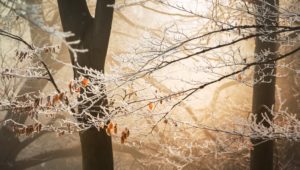
Photo by Ales Krivec on Unsplash
I have been feeling quiet. I’m burning down the last two Yule candles, gradually bringing out those of white and ivory, scented with lavender and herbs. Midwinter festivities are packed away, red table linen and warm-colored throws washed and folded for another season. I’ve been spring cleaning, making glass shine, mopping the scarred old floor, washing cupboards and doors. I walk to and from work bundled up in wool and fleece, the cleats on the bottoms of my boots clicking on the bare pavement and keeping me anchored in the ice and snow. The cold makes my eyes water, my nose run, and my ears hurt. At night, after closing the pools at 6:00, I drop a fluorescent sash around my backpack and chest and hold a small flashlight in the hand closest to the traffic, a white LED light shining ahead, a red flashing light showing from behind.
At times sleep has been thin and wrinkled this winter. In other periods of ebbing sleep I’ve felt frantic and exhausted, but this time I don’t mind. The long cold nights are restful whether I sleep or not, lying comfortable and warm in my chilly room, cocooned in linen sheets and a down comforter. I think of stars overhead, the moon on her path, ebbing and flowing, the tides lapping against the stony coast not so very far away. The hot water pipes in the radiators pop and click reassuringly.
I remember ice skating as a child, gliding smoothly over frost and snow, soaring over magically transformed water, cold biting like the crystalline sound of the sharp-edged skate blades, but warm in body from the rhythmic thrust of my legs. I haven’t skated in more than 50 years, but I remember it now, the freedom, the rhythm, the pleasure, the sense of inconsequence, as though nothing mattered, all was easy and graceful and flowing.
As the old year and winter inch over thresholds into something new, I am companioned by memories. This time last year is a constant whisper in my mind, because this time last year my mother was dying. I am not preoccupied with any time before that. After a lifetime of striving to understand and repair family history and relationships, I have surrendered to what was and what is now over. My battered empathy lies tranquil, not ravaged and torn but manageable, docile, turning over the pieces of last year with gentle intention.
In the clarity of cold winter, in my internal peace, I am alive, aware, receptive in new ways. I learned much in the last year, but intellectually. There was not time for more. The intensity of the situation, the constant crises, the long distance management, the anguish, the helplessness, the impossible tasks, the planning, demanded everything I had. I did not have time to process, to think long and deeply. I did not have the strength for it.
But now, now the past year echoes within my bones and flesh and memory. The ghosts of my feelings and experiences are miraculously without anguish, without horror, whispering a half-remembered story from childhood in which everything works out in the end. 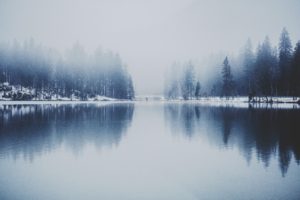
Mom herself does not haunt me. She wouldn’t come back to me in any case, but even before that thought has formed I realize she wouldn’t come back to any person. If she is in a place we can call somewhere, she’s with her animals. No one who knew her well or loved her could doubt it. She wouldn’t come back to anyone, not just me. I knew it before, but now I feel it, and the feeling is gliding, no friction, just freedom and clean, cold air. I can picture her face, laughing, joyful, with manes and tails, paws and shining coats, flopping tongues and pricked ears all around her. And I’m happy for her happiness.
A year ago I was home again after my first trip back to Colorado. I wrote on the ice, on the surface of things. I think without that I might not have stayed the course. It was my lifeline. I was surviving.
A year ago I noticed but did not feel the presence of the birds. The first weeks of Spring came and went; I was focused on the next trip to Colorado, on arranging an estate auction, on supporting my brother in finding renters for Mom’s home, on maintaining communication with Mom’s community, her caregivers, and family. I had no attention for anything but calls and texts as her condition and behavior worsened.
I was not here in April when the magnolia tree began to bloom. I did not kneel in the cold mud of the garden, rejoicing in the chilly sun as the bulbs first thrust up through the softening soil. We were dismantling Mom’s life in Colorado, reading the intimate stories of her history, her loneliness, her fear, and her private struggles. Revealing and releasing stories she never meant anyone to know, casting her life’s possessions and debris into the world, one way or another.
My brother was heroic. The community was stalwart. One step at a time, one item at a time, one mile and minute at a time, we got through it. Somehow.
Home again in May, and back to my life, but only in the motions. Some intuition kept my focus narrow, looking only at the next task, the next step. I gave myself time in the garden, time in the sun. I moved my body. I ate, and worked, and showered, and wrote, releasing my razor-sharp feelings and experience gingerly in words, like so many chips of ice. Now and then I found a moment of peace, a small oasis in between calls and texts, in between Mom’s querulous voice and caregiver check-ins, in between broken nights. But I did not try to plumb the depths of myself. I knew it was not time and I hadn’t the strength to stay safe.
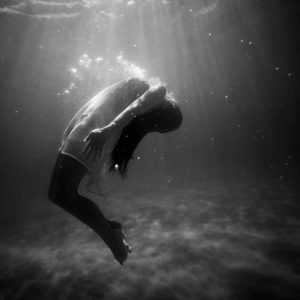
Photo by Christopher Campbell on Unsplash
Summer bloomed fiercely and slowly withered as Mom did, until she was released in August.
She was released, but the work of wrapping up a life went on and on, the majority falling on my brother’s shoulders. He soldiered on. We signed and notarized papers, transferred ownership, sold the house, thought about taxes. I dealt with family jewelry and wrote an obituary, and chose a picture for the local paper.
Autumn came. On Halloween, I thought a year ago today she fell and broke her hip and it all began to end …
Winter came, and passed.
Spring is on the threshold. It feels like my first spring in this new house of ours. And now the ice begins to melt. Now I am not skating on the surface of things because the surface softens and melts, warms into depth and movement, into living water, cleansing and healing. The broken edges, the shards, blunted in the sun before melting away.
Water has ever been my strength and my safety. I take off my skates and float in my depths, my memories weightless, my ghosts drifting quietly, the echoes of the past fading away into peace as I allow them to brush against me, perhaps not for the last time – who knows? I will not be afraid if they visit me again. They are familiar now, and will melt again, as winter melts into spring.
“Ice holds memories … great islands of ice … hold many stories, but they’re just the fragments. Most of the stories are gone.”
—James Roberts at Into the Deep Woods
Questions:
- What signals spring to you?
- What intense experiences have you had to unpack slowly, over a long period of time?
- How do you manage your intense feelings?
Leave a comment below!
To read my fiction, serially published free every week, go here: 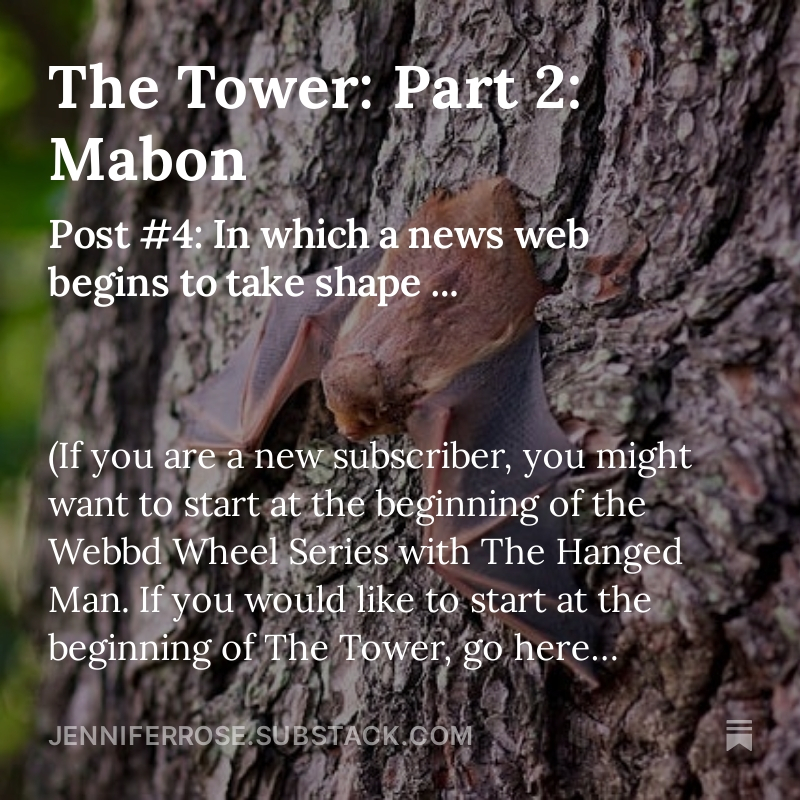
by Jenny Rose | Dec 9, 2023 | A Flourishing Woman, Creativity
Turning and turning in the widening gyre
The falcon cannot hear the falconer;
Things fall apart; the centre cannot hold.
–From “The Second Coming” by W.B. Yeats
The line “the centre cannot hold,” has been running through my mind for several weeks, through all the time I’ve been sick with COVID and whatever nasty virus followed in its wake, and my slow recovery. “The centre cannot hold.” I found a quiet moment and looked it up. I knew it was poetry, but I couldn’t remember who wrote it or what the poem was. Thank you, Google!
W.B. Yeats, of course.
I suppose it’s a common experience to feel we’ve lost our center, our groundedness, when someone significant in our life dies, as my mother just has. I’ve fought against the feeling because over the years I’ve worked so hard to individuate from my mother, to reclaim my right to center my life around something other than her. If she was not the center of my life, why do I feel things have fallen apart since she died in August?
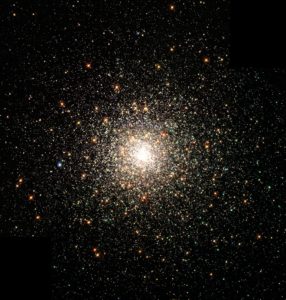
Photo by NASA on Unsplash
Did I fail to reclaim my power, define myself and my value apart from our relationship? Has all my work been for nothing? Are my healing and growth an illusion?
I have been afraid of answering these questions.
When I reread the first three lines of the poem, I first imagined myself as the falconer and the falcon as … my soul? My joy? My wisest self? My intuition? All those and none of those, exactly. The falcon seemed like a piece of myself I lost a long, long time ago when I was child, a piece I struggled through many years and miles to find and reclaim, and now is lost again. It can’t hear me, and I can’t hear it. It feels unbearable. My center didn’t hold. Why didn’t it hold? Did I do something wrong? How do I call it back to me?
And I want to call it back, not haul it back by its jesses. In fact, why is the falcon restrained at all? If it’s truly mine and we belong together, why is it leashed? The idea disturbs me. I want it to be free. I’ve worked too long and hard for my own freedom to relish restraining any other creature. I note I assume the falcon is leashed. The poem doesn’t explicitly say so. Interesting.
Maybe my assumption of leash and jesses reflects all the ways I’ve restrained myself. As a child I internalized restraint. I had to. Everyone else felt free to throw self-control to the winds. Is my feeling of my center not holding asking me to release myself further? Is it time for deeper faith and trust in myself?
As I typed those three lines onto the page to begin this post, I imagined another picture in which my mother was the falconer and I the falcon. She no longer holds the leash. I am free. I have flown away from the only center I was allowed to have and now I’m overwhelmed by my freedom. I don’t know how to be wild. I don’t know how to live without the restraining leather jesses around my slender legs. What if I can’t? What if I perish? Must I find a new falconer to hold the end of my leash? What if my freedom is a mistake and I’m not fit to be free? What if I’ve lost the ability to fly free?
Ugh. Goosebumps.
Don’t get carried away, I say to myself. Slow down. We’re talking about emotional freedom versus physical freedom. You’ve been flying in an ever-widening gyre for years.
What’s changed is that leash, woven of blood and bone and love, woven of years and empathy and need, guilt and shame and obligation, too strong to ever be severed … except, it turns out, by Death.
What do we center around?
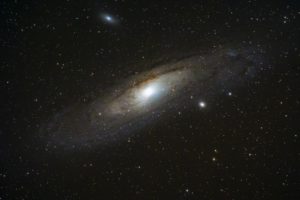
Photo by Bryan Goff on Unsplash
It changes, doesn’t it? In my first 20 years I centered around my family of origin. When I was in my 20s and beyond I centered around a man and my children. Work was in there, too. And my family of origin, particularly my mother, who was not pleased to be sharing the center. The proverbial 3-ring circus. It went on like that until my children emancipated and, to be honest, for some time after. Then, as they slowly faded out of my center, being far away and engrossed in their own lives, I centered around some man (but not the same one; I’m a slow learner) and my mother. Slowly, writing began to nudge for a place in the center as well.
This created real problems. Mom could never tolerate sharing. I was used to her competition with the kids and whatever man I was involved with but the writing would have created a real threat, so I hid it. The more I hid it, kept it inviolate and safe from outside sabotage, the more I centered around it, and the more I centered around it the more threatened she felt, though I’m not sure her reaction was conscious and she had no idea what she was fighting against. She just knew she didn’t have all of me anymore.
She was right to feel threatened, because writing eventually tore me away from her physically and geographically, a thing that had never happened before and a last betrayal she never forgave.
In the stresses and strains of the last couple of years, I lost writing out of my center. Oh, I still did it. I blogged and serial published. I journaled. But as Mom’s health and sanity crumbled, she became my center once again, this time to the exclusion of everything else. Work (generally part of the center for all of us) competed, keeping me sane, physically fit, and anchoring me into a community of friends, but Mom once again became the primary gravitational pull in my center. My days and nights were full of her. I had less and less respite and the intensity increased daily, winding around my life more and more tightly, and then …
She died. In the middle of the night, a night in which I lay awake in Maine while my brother sat vigil with her halfway across the country in Colorado.
When I write it all out like this, I can understand why I’ve felt so dazed. I can feel some grace for myself.
The one thing that’s always been in the center is gone.
“The centre cannot hold …”
Being too old to have any desire to put a man back in the center (been there, done that), and loving my job while realizing it’s not big enough to define me, I turn once again to the truest, most joyful, wildest part of my life: writing.
And that’s scary. If I let writing take all the space, time and energy in the center, what will happen? I don’t even make money with it!
I make joy with it instead. Joy, connection, contribution, authenticity. Writing is not a black hole of failure. It does meet my needs. When I write, I actually feel good enough and sometimes even better than that! No wonder I feel bewildered.
As I write this, it occurs to me for the first time to not only allow things to fall apart, but to participate actively in the falling away and, falling down. To dance in the ruins, even as I weep. I’m reminded of a Rumi quote:
“Dance, when you’re broken open. Dance, if you’ve torn the bandage off. Dance in the middle of the fighting. Dance in your blood. Dance when you’re perfectly free.”
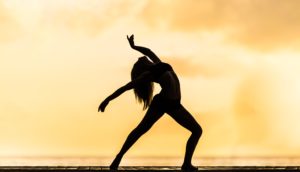
Photo by David Hofmann on Unsplash
Things fell apart. The center did not hold. Change, in other words. Life. Which is to say Death.
So, an unexpected ending to this post. Things are falling apart. I’m ready to stop trying to hold them together. It’s time to let go. Mom already has. Now it’s my turn. What lives in our center changes as we change. It’s time now for me to choose my center, choose it freely without guilt or shame.
Sometimes things fall apart and the center cannot hold.
So we find a new one.
Questions:
- What’s in your center?
- If you were free to choose your center, what would you chose?
- How many things compete for your center? Could you reduce the gravitational pull of your center?
- If your life changed in some dramatic way and you were forced to find a new center, how would you go about doing that?
- Is your center all about others, or do you have something there for yourself, too?
Leave a comment below! To read my fiction, serially published free every week, go here: 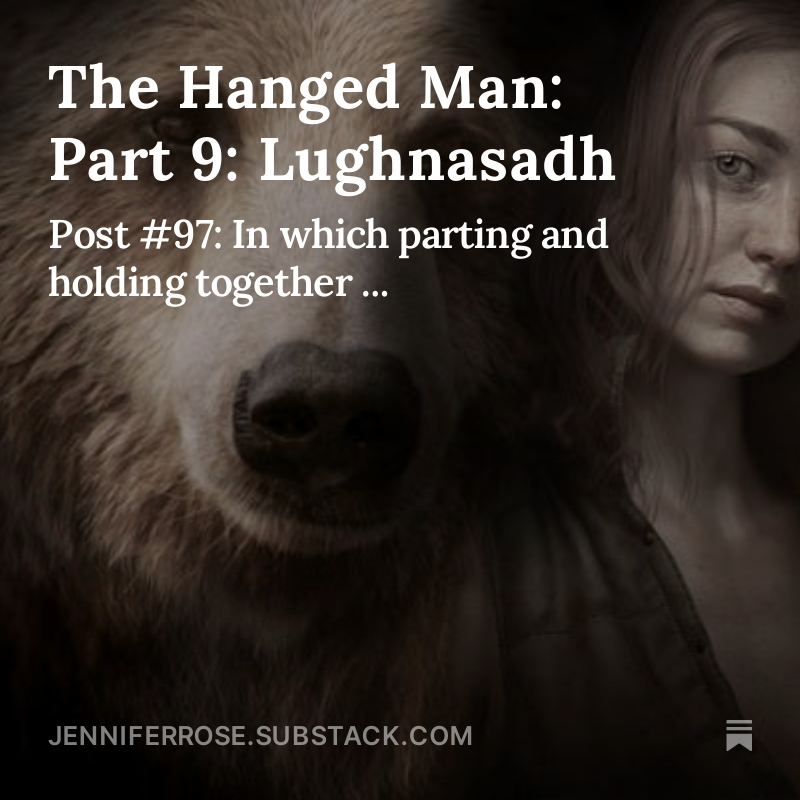
by Jenny Rose | Oct 7, 2023 | A Flourishing Woman, The Journey
This post grew out of two seeds. The first was a piece by a substacker I follow who heard a phrase on a podcast about pleasure in discipline. It struck her that she’s good at finding pleasure in discipline (think productivity), not so good at being disciplined about pleasure.
This struck me, too. I’m quite disciplined when it comes to achieving goals and being productive, but it never occurs to me to apply that same discipline to pleasure. What a thought! How lazy. How irresponsible …
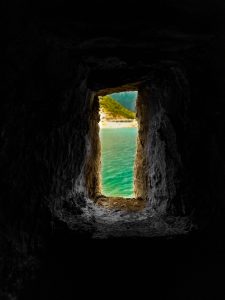
By Veljo Milic on Unsplash
Amused at my internal horror, I played with this idea for a day or two. Discipline is like a doorway, I mused. One can walk through it and into pleasure. Being a strong adherent of Work Before Pleasure (even though I know the work never ends), the doorway metaphor seemed appropriate. For a minute. Until I realized standing in the doorway of discipline, unable to move forward into pleasure, is no good, either. And that’s mostly what I do.
Sigh.
Then, I did my Mabon Tarot spread. I do this at every turn of the wheel. Mabon is Fall Equinox. It came and went while I was wading through paperwork, documents, emails, insurance, retirement investments, and the business of changing banks, cards, automatic payments, and transfer networks.
Did I mention paperwork?
Anyway, I did eventually get to pulling cards about a week after Mabon. The last card of the spread, the “overall outcome” card, happened to be the 9 of Stones (my deck), or the 9 of Pentacles (classic deck). In my deck, this card is the card of tradition, signifying reverence for past wisdom and sacrifice, and ancestral memory.
It stopped me in my tracks. Ever since my mother died in August (hence the endless paperwork), I’ve been preoccupied with family, past and present, living and dead, known and (mostly) unknown. Managing my inheritance has been fraught with guilt, shame, anguished memories, bewildered pain.
I don’t feel reverence. Whatever I feel, it’s not that. (Another thing to feel guilty about.) Whatever happened in my past context of family, I’ve found no wisdom in it. Plenty of sacrifice, though, mostly of and by me.
In the five days since I turned this card over, I’ve been thinking about it. It’s the traditional time of year for many cultures to remember ancestors, the time when the veil between the worlds grows thin, the time when the trees release their leaves to decay and sleep before the next season of growth.
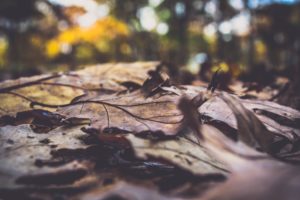
Photo by fancycrave on Unsplash
The discipline of pleasure. And the pleasure of discipline.
Reverence for past wisdom and sacrifice; ancestral memory.
I suddenly remembered an old story I used to tell during this time of year, “The Corpse Bride.” It’s a story out of Jewish tradition. A corpse bride, still wearing her wedding finery, mourns her violent death as she was on her way to her wedding. She grieves for her lost opportunities. A living bride comforts her, vowing to fully experience all that the corpse bride dreamed of and lost. The corpse bride is then able to lie back in her grave and rest in peace.
These pieces seemed to answer a question I haven’t consciously asked. Discipline. Pleasure. Unquiet ancestors. Lost opportunities.
How do we connect with our ancestors in a healthy way? We’re only just beginning to understand epigenetics and the ways in which we’re linked to the generations who came before us. I know something about my DNA, but almost nothing about ancestors. When I think of ancestors, I think of a dignified group of people, wise, healthy, connected, at peace. When I think of my family, I think of rejection, dysfunction, and abandonment. I hardly knew my family, even the ones living during my lifetime. What I mostly knew was I didn’t belong, though I was a biological child of the people I called Mom and Dad.
I feel no connection to ancestors. My unconscious assumption is they wouldn’t want me any more than the family I knew did.
However. The fact is I do have blood ties and a biological family tree, as we all do. I have inherited certain characteristics, behaviors, weaknesses, strengths, and wounds through epigenetics as well as genetics and environmental factors. I am now a twig at the end of a branch on the family tree. Neither of my sons have children. I have no daughter. My two cousins are also childless, as is my brother. I am the last female in the last generation of my direct maternal line.
Me. The highly sensitive, passionate, sensual, creative, noncompliant one nobody wanted!
I dealt several Tarot cards of healing and recovery in that Mabon spread. Perhaps they’re not solely about my healing. In conjunction with the season and this powerful card of ancestry, perhaps I have an opportunity to heal myself and comfort? give peace to? palliate? propitiate? the women who came before me, the women who gave me life.
Whatever came before, I’m here now. I breathe. My heart beats. Half the family resources are in my hands. I have the power to make choices. I choose to continue forward into generosity, healing, and joy. I don’t have ancestral traditions or maps. No one ever gave me a map, because they didn’t know the way themselves. Maybe they didn’t want to go in that direction; maybe they stopped looking for the path. It doesn’t matter now.
What matters now is to live … because they can’t. Like the corpse bride, their earthly opportunities are lost. Maybe from the very beginning I was the one with the potential to bring my female ancestors peace at last, not because I complied with their oppression, but because I refused it. Maybe it’s my wisdom that’s needed, the map in my pocket we all must follow.
The women of my family taught me some of the pleasures of discipline. Perhaps I must teach them about the discipline of pleasure, of joy. Which means I must learn it myself first.
I swam yesterday. I’m required to train weekly for my lifeguard position, but that’s only a good excuse. I swim for pure pleasure. I relished every sensual detail, every rhythmic breath, every stretch and flex of my muscles, the silk of the water. I relished the hot shower afterwards, the long drink of water I took, my clean hair and warm and relaxed body. Because they never did, even when alive. Because they never can.
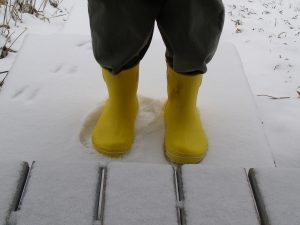
Yellow Boots
This Saturday morning I ran to the store. I took a deep lungful of the grey, humid air, heavy with the promise of coming rain. I savored it. I chatted with the cashier. I bought myself a luxurious dark chocolate bar. I deliberately splashed through a puddle in the parking lot with my bright yellow duckie boots. I smiled at strangers. I drove home with the window open and the damp air stirring my hair. Because they never did these things. (Well, maybe the chocolate. Mom did like chocolate.) Because now they never can.
I sit here on my couch with the cats, the laptop on my lap. I’m burning a scented candle, surrounded by a couple of sleeveless summer shirts I just bought on sale, my journal, lists, notes, the mail. I’m at peace. I don’t have pain. (Mom always had pain.) I’m content. I have friends I love and who love me. Life is good, filled with projects and plans. In a few minutes I’ll get up, put some laundry in, wash the dishes, stand in the doorway and look at the sky, feel the air stirring as the storm approaches. I won’t do these things because I’m disciplined and productive, or because I must, but because I can. I want to. I choose to. These are the small tasks of my life, and I love my life.
All these I’ll do for myself, and also for them, my ancestors, the women who came before me, my blood, my bone, the wombs who gave me life. Because they can’t.
They’re gone. (May they rest in peace.)
But I’m still here.
Questions:
- What does the word ‘ancestor’ mean to you? Do you connect it with a real person in your life?
- Are you prepared to be an ancestor? What wisdom would you pass on to younger generations?
- Do you feel connected to the generations of family before you?
- Would you like to be more deeply connected to living family members? What’s in your way?
Leave a comment below!
To read my fiction, serially published free every week, go here: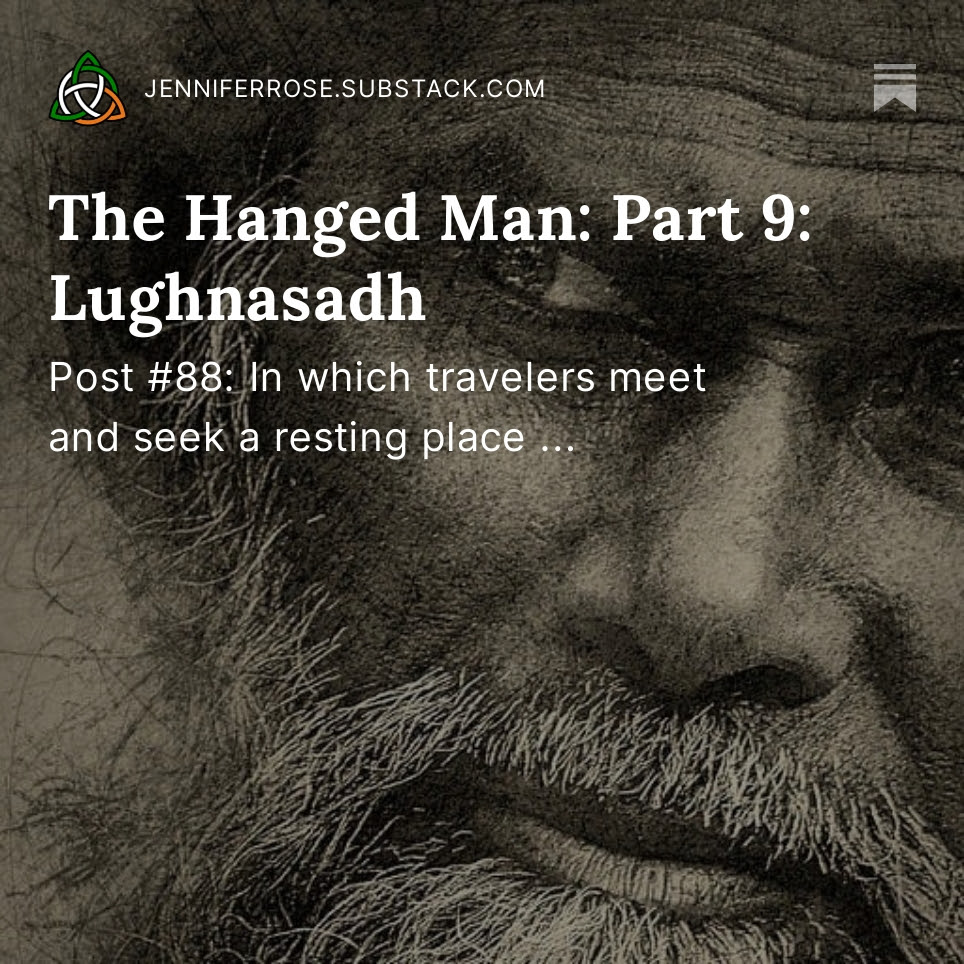
by Jenny Rose | Sep 23, 2023 | A Flourishing Woman, The Journey
Today is Mabon. My calendar informs me it’s my weekend to post on Harvesting Stones. Some weeks I’m all ready to go and need do nothing more than push the publish button. This week these are the first words I’ve written, sitting here on my little porch on Saturday morning watching the clouds tatter before the morning sun.
Mabon, or fall equinox, is the balance point during which the hours of daylight and darkness are equal. It mirrors spring equinox and falls between winter and summer solstice. Fall is my favorite time of year, and this fall I’m in the midst of profound transformation. It’s a harvest season like no other in my life.
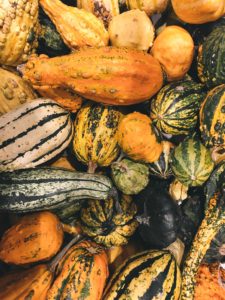
Photo by Brigitte Tohm on Unsplash
Sometimes we are so swept up in the tides of life and death we can do nothing but keep breathing. Days fall away from me, hours drift by and disappear without my awareness. I am focused on the next task, and the next. At the end of each day, I cross to-dos, questions, concerns off my lists, make notes for the next days and weeks, and fall into bed before rising at 4:30 or 5:00 to begin again.
In the midst of the chaos, I remember I choose my life. I’m getting better at just stopping.
Stopping.
I have before me a weekend. Mabon, 2023. It will never come again. A hundred tasks to do. A hundred things to worry about. A hundred choices to make.
Mabon is about balance. Action balanced with rest. Complexity balanced with simplicity. Fear balanced with confidence. Work balanced with play. Grief balanced with joy.
The light; the growing season; the summer of hospice, anguished love, extra caregivers, demented phone calls, medication lists, and, finally, my mother’s death, wane. Trees retain their leaves, but summer’s fierce green fades, bronzing, drying. Sedum and chrysanthemums bloom in the garden. A few sunflowers still flower among the ripening seed heads of their fellows.
Mabon. Balance. And I, a creature, a life among so many other lives, what can I say about it? How can I talk about balance when it feels so far from reach? How will I find balance again on the other side of transformation?
What I hold are impressions, vivid moments of mindfulness and sensuality, unexpected emotions, and the determination to cling fast to myself as autumn rip tides carry me where they will. For I am here, alive, curious, creative, awed, grateful, terrified.
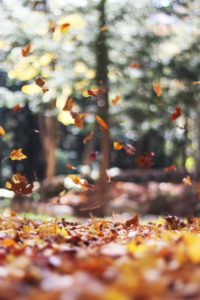
Photo by Autumn Mott on Unsplash
I’m rereading Susan Fletcher, a favorite author. I just finished Oystercatchers. On the last page, this: “You’re this: an onion bulb. The glint of a rabbit’s eye. The clicking of a beetle’s legs on a leaf; the leaf’s brown edge; dandelions; a pebble; windfall fruit.”
I read no more; I was crying too hard.
My mother is always with me. She has always been with me. My blood, my bone, my sculptor. Now, her death is with me, too, and her dying. Grief has not come to the front door, which I’ve left ajar in anticipation of its coming. It’s crawled through cracked windows, slipped through old screens long-dead cats tore with their claws. It’s drifted down the chimney, come up through gaps in my old wood floor from the cellar, crept along the copper radiator pipes, cool now, but soon to be warming.
I carry bewildered pain within me, like a ripe nut in its shell. How does it happen that a human being, intelligent, talented, competent, with so much to give, can have no feel for life? How can anyone refuse to engage with the mystery, the glory, the terror, the sweetness, and yes, even the pain of what it means to be alive, to love, to be broken and heal over and over?
Isn’t it strange that I find her in the small delights she herself would never have recognized as sustenance, as miracles? Something in Mom was too blind or too broken or perhaps too frightened to allow life to clasp her in its arms. Something. We could never talk about it. I knew it was there, but she would not reveal even the edges of her true experience.
In the end, as the fogs of dementia surrounded her, she was at last able to say she loved me. I have that, at least. And yet, she was demented … But I choose to believe.
Mabon, then, is the autumn garden. Planting blue and white grape hyacinths in drifts with daffodils under the magnolia so in spring they will bloom and naturalize as the seasons come and go. Shoveling and spreading compost mixed with aged cow manure, rich with earthworms and beetles. Pruning, trimming, prying weeds and grass out of cracks in the sidewalk and driveway. Disturbing our small brown toads as I weed and clean up debris in readiness for the blanketing fallen leaves. Dividing and transplanting. Spider webs jeweled with dew. Chilly mornings and gorgeous afternoons. The smell of my catnip, ecstatically trampled and chewed, no doubt discovered by the neighborhood black cat, Winston by name. Planting a few end-of-season sale perennials from our local greenhouse: lavender, black-eyed Susan, sedum. My garden manicure of dirt ground under my fingernails and into my cuticles, always dry and ragged from so much time in the pool. It won’t scrub away, but it will soak off in the pool during my next lesson. Peeling skin and blisters. Bruised knees.
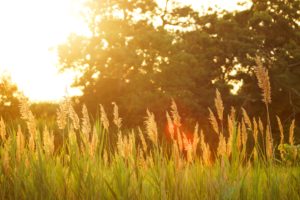
Photo by Dakota Roos on Unsplash
Mabon is the early morning mist rising from the Kennebec River three or four blocks away. It moves up from the surface of the water, along the dark, early-dawn streets and walkways, enveloping the trees, rising to hide the church spire and then gently dissolving as the sun rises while the crows call and the neighborhood rooster announces the dawn.
Mabon is the taste of Apple Pie Chai (Republic of Tea) with a dollop of half n’ half in it, as delicious as it sounds. It’s scented candles burning in the first hours of my day as I journal, make lists, think about the day ahead. Orange, red, and golden candles – orange and spice, apple and cinnamon, sandalwood. One of my closest friends says sandalwood is a “dirty hippy smell.” The thought makes me smile every time I light it. The apples and cinnamon candle sputters companionably because it has a wooden wick (Book&Reverie candles on Etsy).
Mabon is linen sheets dyed a glorious old gold on my bed, textured, heavy, luxurious. It’s socks and sneakers instead of my Keen sandals. It’s my heavy grey shirt jacket with a Buff bandana or a scarf.
Mabon. The Wheel of the Year turns. Seasons and cycles. These things remain. These things are predictable, comforting. They sustain me.
This year, Mabon is also a blizzard of what feels like endless documents, digital, paper, filed away, stacked on my desk, put into binders, stored on USB sticks. Soon, Mom’s house in Colorado will sell, the requisite paperwork will be filed for tax preparers and other legalities. Printing and scanning, FedEx drop offs, notarizing, will eventually be complete. The business of opening accounts with a new bank, obtaining new cards and checks, changing automatic payments and direct deposits, connecting to other accounts, will be finished. Insurance, retirement accounts, paying off debt – all will be managed. I will create new systems, effective and simple.
This week my nearly 20-year-old Subaru failed to pass inspection. I can’t understand it. The driver’s side door handle still works; I don’t really need the others. It drives. I don’t need AC or an audio system. I can manage without being able to open the back hatch. The heat and defrost work if I put in the fuse, and the battery is good as long as I don’t leave the fuse in when I park it. I know exactly where to bring my fist down on the hood when an ice storm seals it shut and I need to open it and put the fuse back in.
It needs $3000 of work. It’s worth $1100.
I need a new car. More tasks. More paperwork. Insurance. Registration.

Photo by Nathan Dumlao on Unsplash
These things, the documents, the tasks, the paperwork, phone calls, texts, emails, are nothing but the chrysalis of transformation. I know it. I feel stressed and overwhelmed much of the time, frustrated by delays, miscommunications, jumping through legal and bureaucratic hoops. It’s all temporary, though. It will fall away, along with the autumn leaves. The chrysalis will shred in the dark winds of late autumn and winter, this rip tide will release me, and then … something new.
Through it all is my mother. My memories of her. The pain of my love for her. I’ve inherited so much more from her than assets. There is some comfort, some strange, painful comfort, in remembering to pause. To choose. To stop. To be touched, broken open by the small daily beauties and comforts of life. The taste of creamy tea. The scent of sandalwood. The texture of rich soil. The late copper and garnet blooms of mums. The mist rising into the sun’s golden warmth. Most of all, the painful risk of loving friends, family, the world, life.
Look, Mom. See the little toad? Let’s put him here, under the rhododendron. Remind me to buy toad houses.
To read my fiction, serially published free every week, go here: